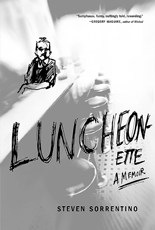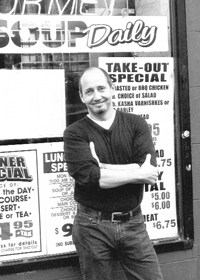 Passed Up By His Own Life
Passed Up By His Own Life
Book Review of 'Luncheonette'
Volume 75, Number 33
| August 18 - 24,
2005
BOOKS
LUNCHEONETTE
By Steven Sorrentino
ReganBooks
243 pages $24.95
Passed Up by His Own Life
Steven Sorrentino’s “Luncheonette’ serves devotion, depression, dreams deferred
By SETH J. BOOKEY
When a crisis strikes, family members spring into action, but there’s always someone who becomes the most responsible party, the case manager, or “the good one.” For Steven Sorrentino, when his father became mysteriously paralyzed and put on a respirator on Christmas Eve 1980, he became “the good son.”
Not that he hadn’t been a good son before, but the Yuletide ER visit became more of a U-turn than a crossroads for Steven.
Prior to that, with his father’s encouragement, Steven had moved to New York to pursue a career in musical theater, a by-product of his father’s love of 1940s crooners. For a gay, 19-year-old, New York City in 1977 presented a smorgasbord of sexual opportunities and life experience––way more than he could dreamed of if he stayed in the New Jersey suburbs. But when his father is stricken, the older man worries about making sure that his luncheonette, Clint’s Corner, keeps running almost more than he does about his health.
Dutiful son that he is, Steven walks into the restaurant early one morning armed with notes and immediately plunges himself into scoring pork roll, toasting Knipp’s rolls, and learning the peculiarities of the luncheonette’s regular customers. Brassy Dolores, the waitress who bellows vital advice in a mix of Polish slang, malapropisms, and mispronunciations, teaches him much.
Over the months that follow, Steven winds up giving up his New York apartment, and loses contact with his sole gay friend, Parris, who wins a role in a theatrical road show. His father meanwhile achieves a measure of recovery and, with the community’s charitable assistance, remodels the family home to accommodate his wheelchair and secures a van outfitted with hand controls. Already a fixture in local politics, the father moves on to greater civic successes, not letting his paralysis alter his spirit.
It is Steven who is shackled. Like George Bailey in “It’s a Wonderful Life,” he has chosen to stay in his hometown and help out the family. But, Steven has no life whatsoever outside of the diner and the family. Even after the luncheonette is sold, he inexplicably remains, his sole downtime pleasure being an unfulfilling one-sided affair with a married man. Steven remains in this rut for eight years.
There are many ways in which “Luncheonette” succeeds––as a love letter to a talented, determined father and also as a slice of local color and family history. The book also proves that tedious routines can be crazy-making. The last 40 pages of the book are the best part, as we discover just how depression and the pressure to be the “good son” are Steven’s chains.
As a memoir, “Luncheonette” serves up a lot of details, but at first very little of what led Steven to abruptly lose his motivation while a very young man. The lack of conflict is remarkable. There are so many daily diner details, you might just as well be watching a few episodes of “Alice,” except even Linda Lavin’s character did some cabaret and had an occasional date. Steven seems to be a bystander in his own life, and we don’t really know why.
Sorrentino paints an icky-sweet picture of his brief, rosy New York life and how the entire family hung on his every word when he would visit Jersey. He takes it for granted that readers will understand that life in New York was clearly more glamorous than in West Long Branch. We read a bit about friends in the theater and men with whom he dallied in the city, but learn nothing about his struggles there, even though we know he was not a smashing success at “that New York thing,” as one aunt puts it. There’s one failed audition, a post-mortem with other hopefuls at Howard Johnson’s in Times Square, and one-night stands memorialized in matchbooks, but that’s all.
Any reader, and especially a gay reader, would have appreciated some insight into the lost world of pre-AIDS New York—fun, scary, different for a young man still not out to his Italian-American family a train-ride away, navigating the choppy waters of sex and drugs. Steven hides in the cocoon of West Long Branch, just as the AIDS crisis heats up. Oddly, the word AIDS is never mentioned anywhere in “Luncheonette.” Did this factor into Steven’s self-imposed exile? Was playing with the big boys in New York, in bed or on stage, more than he could handle?
The twin plagues of depression and pressure to do what’s expected of him go a long way to make sense of Steven’s inertia, but in the end cannot fully explain the despair obviously felt by this young man. Only years later, we learn via the book, does he manage to put his life and his silent struggles into perspective. As memoirs go, more self-knowledge and insight and fewer lunch details would have been more appetizing.
BOOKS

LUNCHEONETTE
By Steven Sorrentino
ReganBooks
243 pages $24.95
Passed Up by His Own Life
Steven Sorrentino’s “Luncheonette’ serves devotion, depression, dreams deferred
By SETH J. BOOKEY
When a crisis strikes, family members spring into action, but there’s always someone who becomes the most responsible party, the case manager, or “the good one.” For Steven Sorrentino, when his father became mysteriously paralyzed and put on a respirator on Christmas Eve 1980, he became “the good son.”
Not that he hadn’t been a good son before, but the Yuletide ER visit became more of a U-turn than a crossroads for Steven.
Prior to that, with his father’s encouragement, Steven had moved to New York to pursue a career in musical theater, a by-product of his father’s love of 1940s crooners. For a gay, 19-year-old, New York City in 1977 presented a smorgasbord of sexual opportunities and life experience––way more than he could dreamed of if he stayed in the New Jersey suburbs. But when his father is stricken, the older man worries about making sure that his luncheonette, Clint’s Corner, keeps running almost more than he does about his health.
Dutiful son that he is, Steven walks into the restaurant early one morning armed with notes and immediately plunges himself into scoring pork roll, toasting Knipp’s rolls, and learning the peculiarities of the luncheonette’s regular customers. Brassy Dolores, the waitress who bellows vital advice in a mix of Polish slang, malapropisms, and mispronunciations, teaches him much.
Over the months that follow, Steven winds up giving up his New York apartment, and loses contact with his sole gay friend, Parris, who wins a role in a theatrical road show. His father meanwhile achieves a measure of recovery and, with the community’s charitable assistance, remodels the family home to accommodate his wheelchair and secures a van outfitted with hand controls. Already a fixture in local politics, the father moves on to greater civic successes, not letting his paralysis alter his spirit.

It is Steven who is shackled. Like George Bailey in “It’s a Wonderful Life,” he has chosen to stay in his hometown and help out the family. But, Steven has no life whatsoever outside of the diner and the family. Even after the luncheonette is sold, he inexplicably remains, his sole downtime pleasure being an unfulfilling one-sided affair with a married man. Steven remains in this rut for eight years.
There are many ways in which “Luncheonette” succeeds––as a love letter to a talented, determined father and also as a slice of local color and family history. The book also proves that tedious routines can be crazy-making. The last 40 pages of the book are the best part, as we discover just how depression and the pressure to be the “good son” are Steven’s chains.
As a memoir, “Luncheonette” serves up a lot of details, but at first very little of what led Steven to abruptly lose his motivation while a very young man. The lack of conflict is remarkable. There are so many daily diner details, you might just as well be watching a few episodes of “Alice,” except even Linda Lavin’s character did some cabaret and had an occasional date. Steven seems to be a bystander in his own life, and we don’t really know why.
Sorrentino paints an icky-sweet picture of his brief, rosy New York life and how the entire family hung on his every word when he would visit Jersey. He takes it for granted that readers will understand that life in New York was clearly more glamorous than in West Long Branch. We read a bit about friends in the theater and men with whom he dallied in the city, but learn nothing about his struggles there, even though we know he was not a smashing success at “that New York thing,” as one aunt puts it. There’s one failed audition, a post-mortem with other hopefuls at Howard Johnson’s in Times Square, and one-night stands memorialized in matchbooks, but that’s all.
Any reader, and especially a gay reader, would have appreciated some insight into the lost world of pre-AIDS New York—fun, scary, different for a young man still not out to his Italian-American family a train-ride away, navigating the choppy waters of sex and drugs. Steven hides in the cocoon of West Long Branch, just as the AIDS crisis heats up. Oddly, the word AIDS is never mentioned anywhere in “Luncheonette.” Did this factor into Steven’s self-imposed exile? Was playing with the big boys in New York, in bed or on stage, more than he could handle?
The twin plagues of depression and pressure to do what’s expected of him go a long way to make sense of Steven’s inertia, but in the end cannot fully explain the despair obviously felt by this young man. Only years later, we learn via the book, does he manage to put his life and his silent struggles into perspective. As memoirs go, more self-knowledge and insight and fewer lunch details would have been more appetizing.
Posted: Thu - August 18, 2005 at 01:29 AM
Quick Links
Calendar
| Sun | Mon | Tue | Wed | Thu | Fri | Sat |
Categories
Archives
XML/RSS Feed
Statistics
Total entries in this blog:
Total entries in this category:
Published On: Jun 20, 2009 07:03 PM
Total entries in this category:
Published On: Jun 20, 2009 07:03 PM